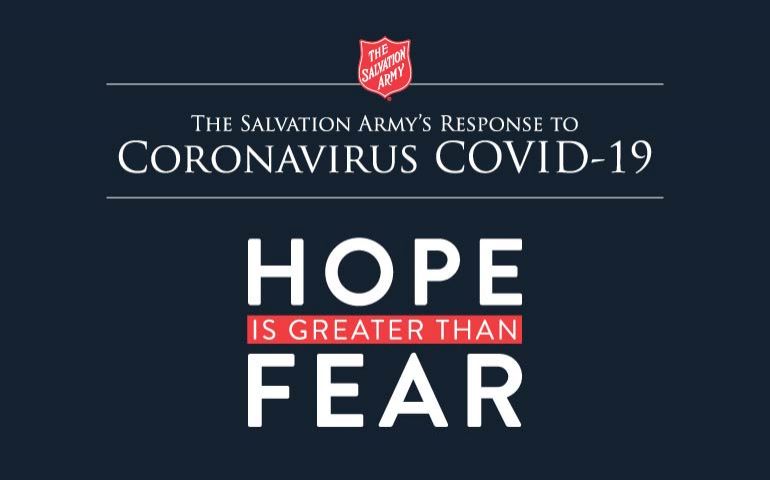Coronavirus in The Netherlands: The Cartoonist, the Cruise Ship and the Prison Cell
Christopher Priest | chris.priest@uss.salvationarmy.org | (678) 485-4735

Atlanta, GA: All means possible are being deployed by The Salvation Army in The Netherlands as they seek to meet homeless people’s needs arising from the COVID-19 pandemic. The low-lying European country has recorded 30,449 cases to date, with 3,459 confirmed deaths (4/17/2020). Shops, businesses, schools and many public utilities remain closed, with social distancing regulations in place and gatherings of more than three people prohibited.
Across the country, a key Salvation Army focus is the impact of coronavirus on homeless people. To this end, an awareness-raising campaign has been launched to address how the Dutch government’s instructions to stay at home could be applied in the case of people without a home. The campaign – running across TV, radio, online and in major national newspapers – asks simply ‘Stay at home? How?’
Menno de Boer, Leger des Heils (The Salvation Army) Marketing and Communications, explains: ‘The best solution to this problem is to provide homeless people with a permanent place to live … either on their own, or a safe place to live with help and guidance from an organisation like The Salvation Army.’
The initiative attracted the attention of popular topical cartoonist Loko, who created a visual representation of the question that is being posed by The Salvation Army. In the cartoon, a slug asks a snail: ‘Jij hebt makkelijk praten, maar waar moet ík dan heen?’ (‘Easy for you, but where am I supposed to go?’)
The Salvation Army’s campaign has been backed up throughout the country by provision of additional temporary accommodation for homeless and other vulnerable people.
In Rotterdam, The Salvation Army has partnered with EasyHotel and the cruise ship Allegro which is moored in the city’s harbour. The accommodation – operating at greatly reduced capacity because of the coronavirus crisis – is being made available to homeless people who are susceptible to COVID-19 because of underlying health conditions. Building on the experience of an initiative in nearby Gouda, The Salvation Army’s regional director Gert Jan Freeke explains: ‘Having your own space with your own sanitary facilities is good, particularly with the need for scrupulous hygiene at this time.’
Owner of the Allegro, Mark Jongedijk, is glad that his ship – with the ‘best view of the city’ – is being put to good use. ‘This is a great way to still use the ship, and to give people the opportunity to stay overnight with us for whom that is usually not the case,’ he adds.
The initiative in Rotterdam is being supported by the municipal authority.
Meanwhile, slightly less luxurious – but no less valuable – accommodation has been opened by The Salvation Army in a redundant prison in Maastricht. Forty-one former cells have been furnished through the generous support of IKEA.
‘Initially, their reaction was a bit wait-and-see, but now the residents are happy,’ said The Salvation Army’s facility manager, Joke Wisseborn. ‘Some of our clients say: “I've never had a room of my own”. Others say: “I used to live here [in the prison], now I am again!” But people are happy with the security this building provides, and particularly the privacy. They have their own shower, for example.’
Elsewhere in The Netherlands, The Salvation Army was delighted to receive six richly-filled bags of groceries in Eindhoven, from a women’s group at the local mosque. ‘We must help each other especially at this time,’ read the accompanying note. The goods will be distributed to needy people in the community.
Meals are also being distributed in Dokkum, thanks to the kind support of KB Food and Drink. Forty trays of tasty chilli con carne helped to provide a nutritious takeaway meal for homeless people in Ede. And Salvation Army youth workers in Kennemerland have provided local young people with a ‘mystery’ bag of fun activities, including a challenge for the older recipients.
IHQ Communications
International Headquarters
The Salvation Army annually helps more than 30 million Americans overcome poverty, addiction, and economic hardships through a range of social services. By providing food for the hungry, emergency relief for disaster survivors, rehabilitation for those suffering from drug and alcohol abuse, and clothing and shelter for people in need, The Salvation Army is doing the most good at 7,600 centers of operation around the country. In the first-ever listing of “America’s Favorite Charities” by The Chronicle of Philanthropy, The Salvation Army ranked as the country’s largest privately funded, direct-service nonprofit. For more information, visit www.SalvationArmyUSA.org. Follow us on Twitter @SalvationArmyUS and #DoingTheMostGood.